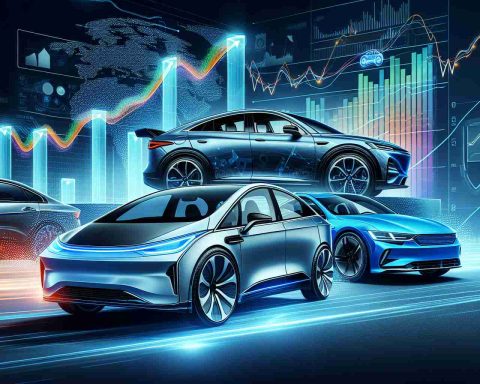- Senate Republicans, led by Senators John Barrasso and Deb Fischer, propose significant changes to existing electric vehicle (EV) incentives.
- The legislative push seeks to remove a $7,500 tax rebate for new EVs, a $4,000 credit for used EVs, incentives for charging stations, and credits for leased vehicles.
- Senator Fischer introduces a $1,000 fee on new EV purchases, equating it to traditional gas taxes contributing to the Highway Trust Fund.
- The proposed changes might disrupt automakers’ investments in EV and battery production, which rely heavily on federal incentives.
- Transportation Secretary indicates a need for EVs to contribute to road maintenance, but acknowledges it is a complex issue.
- The future of EV policy and America’s transition to sustainable transportation is highly debated, balancing innovation and infrastructure needs.
A political storm brews in Washington as a faction of U.S. Senate Republicans charts a bold course against electric vehicle (EV) incentives. Their latest legislative push aims to disrupt the electric revolution with the introduction of two significant bills.
At the heart of this legislative movement, Senator John Barrasso, flanked by 14 Republican colleagues, proposes a complete dismantling of the existing $7,500 tax rebate for new electric vehicle buyers. The bill doesn’t stop there; it seeks to abolish the $4,000 credit for used EVs and slash federal investment incentives for charging stations, while pulling the plug on credits for leased vehicles. Should this proposal morph into law, the tax incentives could vanish within a mere 30 days. This potential overhaul sends shivers through Detroit, where automakers have sunk billions into EV and battery production, viewing these credits as critical to the industry’s transformation.
In a complementary bid, Senator Deb Fischer leads a charge for a $1,000 fee tethered to every new electric vehicle purchase. Fischer underscores the analogy: this mirrors what traditional vehicle drivers contribute over a decade through federal gas taxes to the Highway Trust Fund. She highlights the heavier footprint of many electric vehicles, noting their increased wear on roads and bridges compared to their gas-powered cousins. Meanwhile, the Transportation Secretary hints at a brewing consensus: electric vehicles must shoulder some responsibility for road maintenance, yet the path forward remains complex and elusive.
As debates sizzle, the future of America’s roads and EV policy hangs on a knife edge, reminding us that the transition to a sustainable future balances innovation against infrastructural imperatives.
Electric Showdown: How Dismantling EV Incentives Could Reshape America’s Automotive Future
Breaking Down the Potential Legislative Changes
Recent developments in Washington have sparked intense debate as a group of U.S. Senate Republicans spearhead efforts to dismantle key incentives promoting the adoption of electric vehicles (EVs). Two new bills are being introduced intending to significantly alter the framework that currently supports the electric vehicle industry.
Key Legislative Proposals:
1. Abolishing EV Purchase Incentives:
– Led by Senator John Barrasso, a proposal to eliminate the $7,500 tax rebate for new electric vehicle buyers is gaining traction. Additionally, this bill aims to remove the $4,000 tax credit for used EVs, and cut federal grants for building charging infrastructure. It also proposes ending credits for leased EVs.
2. Introducing a New EV Fee:
– Senator Deb Fischer has introduced a proposal to impose a $1,000 fee on every new electric vehicle purchase. This fee is compared to the federal gas taxes paid by traditional vehicle drivers over ten years, aimed at contributing to the Highway Trust Fund. Fischer argues heavier EVs cause more wear on infrastructure.
Broader Implications and Global Context
The proposed removal of these incentives is a critical pivot point affecting numerous stakeholders:
Impact on the Automotive Industry:
– Investment Risks:
– Automakers, especially those with large investments in EV technology and production, including Detroit-based companies, face uncertainty as these incentives are integral to their business models and market expansion plans.
Environmental and Economic Considerations:
– Sustainability Goals:
– The U.S. aims to reduce carbon emissions and promote sustainable transportation modes. Cutting EV incentives may slow the transition and affect national commitments to environmental targets.
Technological Growth:
– Innovation Stifled:
– With potentially decreasing EV adoption rates, advancements in battery technology and EV infrastructure could see a slowdown, impacting global competitiveness.
Global Perspectives and Comparisons
It’s insightful to consider how other countries manage EV incentives and road infrastructure funding:
European Union:
– Many EU countries continue to heavily subsidize EVs, looking at the long-term reduction in fuel dependency and emissions.
China:
– As a leader in the electric vehicle market, China offers extensive incentives to both manufacturers and consumers, reflecting its commitment to dominating the global EV market.
Related Questions and Answers
What are the potential trade-offs between EV incentives and roadway maintenance?
– Currently, traditional gasoline taxes fund roadway maintenance. As EV adoption grows, restructuring the funding model to include EVs becomes vital. The balance involves crafting policies that support both the growth of EVs and infrastructure upkeep.
How could the elimination of incentives affect consumer behavior in the short term?
– Removing or reducing EV tax incentives might lead to a drop in consumer interest and sales in electric vehicles, slowing down the transition from internal combustion engines to electric.
Are there alternative funding mechanisms being considered for road maintenance?
– Discussions include adopting a vehicle miles traveled (VMT) tax, which would charge drivers based on distance driven, leading to equitable contribution regardless of vehicle type.
Further Reading and Sources
For those interested in exploring these dynamics further, the following websites provide comprehensive information on EV policies and automotive industry trends:
– U.S. Department of Transportation
– U.S. Department of Energy
– International Energy Agency
These platforms offer insights into ongoing legislative developments and their potential impacts on both local and global scales.


















